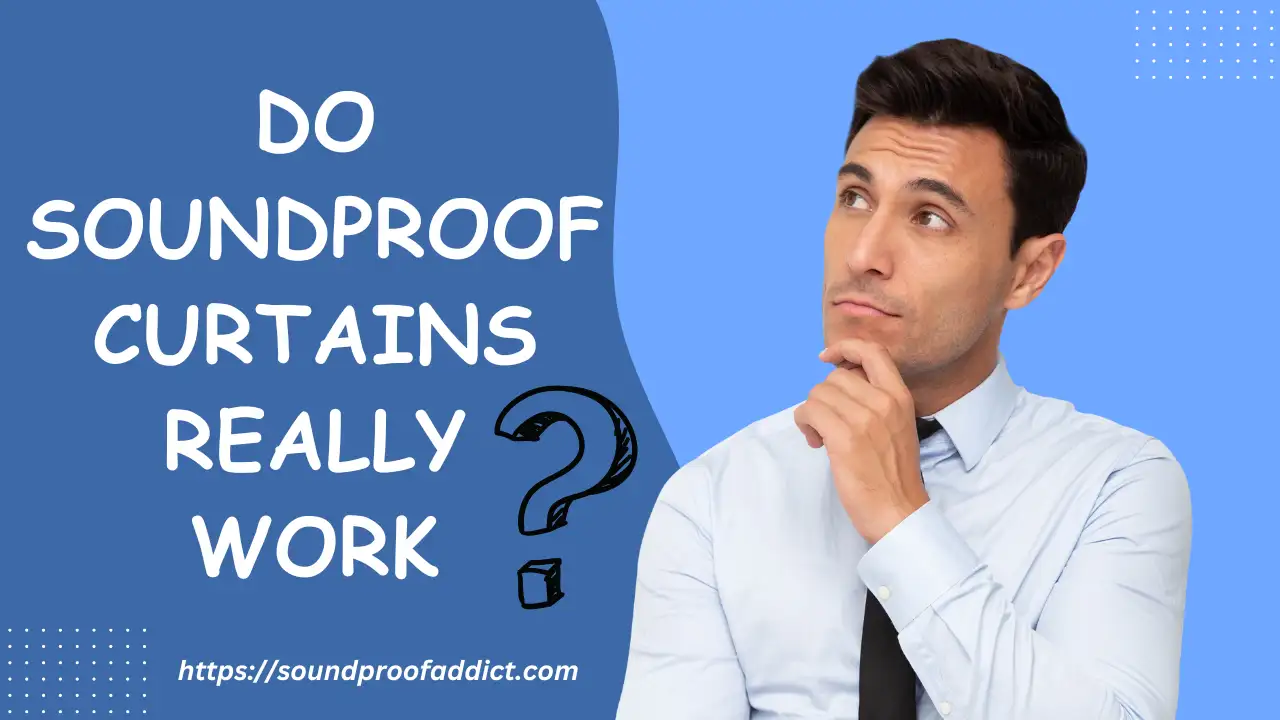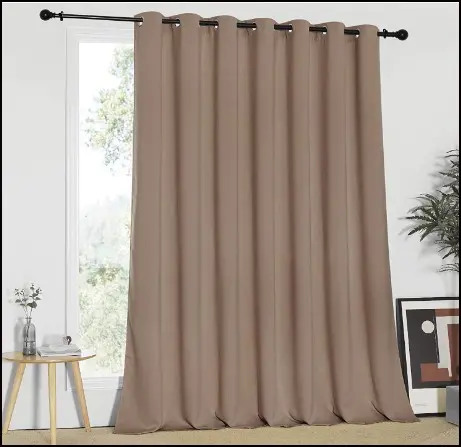Do Soundproof Curtains Really Work? The Reality

In today’s fast-paced and noisy world, finding peace and quiet at home can be a real challenge.
External noises such as traffic, construction, and even your neighbors can disrupt your relaxation and sleep.
One popular solution that many people turn to is soundproof curtains. But do soundproof curtains really work?
In this article, we will decode the effectiveness of soundproof curtains and how you can use them to create a more peaceful environment in your home.
Let’s dive in.
Do soundproof curtains work?
Yes, soundproof curtains can be effective in reducing noise to some extent, but their effectiveness depends on various factors. Soundproof curtains work by employing dense materials and multiple layers that absorb and dampen sound waves.
These materials are designed to have excellent sound-absorbing properties, allowing them to minimize the transmission of sound.
When the sound waves encounter the curtains, they are partially absorbed, reducing their intensity before reaching your living space.
In simpler terms, soundproof curtains act like a barrier that captures and lessens the noise, making it less intrusive. They are made with special materials that soak up the sound, so when the noise from outside encounters the curtains, it gets muffled and doesn’t pass through as loudly.
How much do soundproof curtains reduce noise?
In our test, we have found that good quality soundproof curtains can reduce the noise level by up to 29 db. By the way, the extent of noise reduction may vary depending on factors like the curtain’s quality and the specific frequency of the noise.
To provide evidence of the effectiveness of soundproof curtains, our SoundProof-Addict team created a controlled environment where we measured the noise level produced by a bike horn placed outside a door. Without the soundproofing curtain, the noise level measured approximately 105 dB at a distance of 30 inches from the horn.
Next, we installed a “high-quality” 5-layed soundproof curtain, measuring 5 mm in thickness. We repeated the test with the horn and measured the noise level again. And we noticed a significant reduction in noise, with the measurement dropping to 76 db. This represents a substantial difference of 29 dB.
Similarly, a 3-layered curtain, H.VERSAILTEX Patio Curtains reduces the noise level by approximately 24 dB. And a 2-layered NICETOWN curtain, reduces the noise level by 13.7 dB.
And also a YouTube channel named Shizuka Soundproof Curtain, a dedicated channel about soundproof curtains, which conducted a similar test and achieved noise reductions of over 19 dB when using soundproof curtains on windows.
In our tests, high-quality soundproof curtains reduced noise levels by up to 29 dB. H.VERSAILTEX Patio Curtains (3-layered) reduced noise by approximately 24 dB, and NICETOWN curtains (2-layered) reduced noise by 13.7 dB.
What are soundproof curtains made of?
Soundproofing curtains are usually made of polyester, wool, suede, vinyl, velvet and other similar materials. Polyester provides sound-absorbing properties, wool is a natural insulator, while suede and velvet provide a luxurious look and feel while absorbing sound. Vinyl is a common material for soundproof curtains, it also helps in reducing noise to a great extent.
Factors that influence the effectiveness of a soundproof curtain
The effectiveness of a soundproof curtains depends on a lot of factors. Here are some of the most important factors:
1: Thickness
The thickness of the curtain play a crucial role in soundproofing. Sound waves are vibrations that travel through the air.
When they encounter a dense and thick material, these materials absorb and dampen the sound energy. This is due to a phenomenon called sound absorption, where the vibrations are converted into tiny amounts of heat energy within the material.
Scientifically, this is measured by the Sound Transmission Class (STC) rating, which quantifies the material’s ability to block sound.
All in all, thicker materials have more ability to absorb and dampen sound waves than thinner ones.
2: Material
In my opinion, the material of a curtain carries more weight at soundproofing than any other factors.
That’s why I would recommend you to go for heavy materials such as velvet, suede or polyester as they absorb sound waves better.
These dense fabrics help to prevent sound from bouncing off the surface, resulting in better noise reduction.
3: Room Acoustics
The overall acoustics of a room can influence the curtain’s effectiveness. If a room has a lot of hard surfaces like glass, tile, or wood, sound waves can bounce around and create echoes.
These reflections can diminish the curtain’s ability to block sound, as the waves will continue to reverberate within the space.
This is why combining soundproof curtains with acoustic treatments, such as adding rugs, drapes, or wall panels, can enhance soundproofing.
4: Combining Methods
Soundproofing is often most effective when multiple techniques are employed. By combining soundproof curtains with other methods like double-glazed windows, sealing gaps, or adding insulation, you create a multi-layered defense against noise transmission.
This is analogous to wearing both a raincoat and using an umbrella to stay dry during a heavy downpour.
Best soundproof curtain: Editor’s Choice
- Variety of Colors and Sizes
- Professional Appearance
- Easy Installation
- Affordable Option
The NICETOWN Patio Blind Soundproof curtain is a highly recommended option for those seeking a door soundproofing solutions. It is available in a variety of colors and sizes, and it offers versatility in finding the perfect fit for your door.
The curtain is made of polyester and featuring a three-layer design, it effectively blocks out noise, provides thermal insulation, and offers 90% blackout capabilities.
With an impressive rating of 4.7 out of 5.0 and positive reviews from satisfied customers, such as AmOzon Woman, who described it as the best decision they’ve made, this curtain proves its effectiveness in creating a quieter environment.
Are there alternatives of soundproofing curtains?
Yes, there are several alternatives options to soundproofing curtains:
1. Soundproof blankets
In my opinion, soundproof blankets are a perfect alternative to soundproofing curtains. These blankets are designed to absorb and dampen sound.
Soundproof blankets are made from dense and heavy materials with excellent sound-absorbing properties. They are often quilted or layered to enhance their effectiveness in blocking and absorbing noise
2. Acoustic Panels
Acoustic panels are one of the most popular and effective for improving the acoustic quality of a room. These panels are designed to absorb and control sound waves, reducing echo, reverberation, and unwanted noise.
Acoustic panels are typically made from sound-absorbing materials such as fiberglass, foam, or specialized acoustic fabric.
3. Heavy-Duty Blinds or Shades
Heavy-duty blinds or shades are an alternative option for soundproofing and light control in a space. Unlike regular blinds or shades, heavy-duty blinds or shades are made from materials such as vinyl, fabric with insulation backing, or layered fabrics.
Conclusion
Soundproof curtains have been studied, tested and proven to reduce noise levels. They offer a practical solution without major construction. Made with layers of materials, they absorb sound waves, blocking them from entering or leaving a room.
Their versatility is unique. They reduce external noise and minimize internal echoes. Ideal for spaces such as recording studios, conference rooms, or home theaters. Many sizes and designs, to match aesthetic preferences and maintain functionality.
For maximum effectiveness, proper installation is key. Make sure the curtain covers the entire window/opening, no gaps. Choose thicker curtains with a higher at least 3-layers for better insulation. Layer with additional window treatments like blinds/shades, for extra sound protection.
Frequently Asked Questions
Q1. Can curtains block street noise?
Ans: Yes, soundproof curtains with dense materials can help reduce street noise by absorbing and dampening sound waves.
Q2: Do soundproof curtains block light?
Ans: Yes, many soundproof curtains are designed to block light as well, providing both noise reduction and light control.
Q3: Do all curtains absorb sound?
Ans: Not all curtains absorb sound. Soundproof curtains with specific dense layers are designed for effective sound absorption.
Q4: Are soundproof curtains the same as blackout curtains?
Ans: No, soundproof curtains are not the same as blackout curtains, although they can sometimes overlap in their functionality. Soundproof curtains are designed specifically to reduce noise transmission and absorb sound waves. On the other hand, blackout curtains are designed primarily to block out light and create a darkened environment. (Read: Do blackout curtains soundproof?)
Related: What is the difference between soundproof curtains and blackout curtains?

